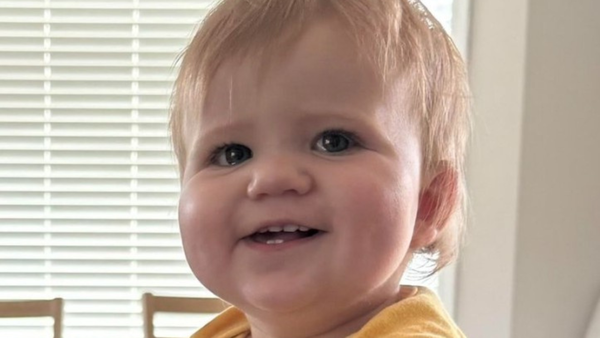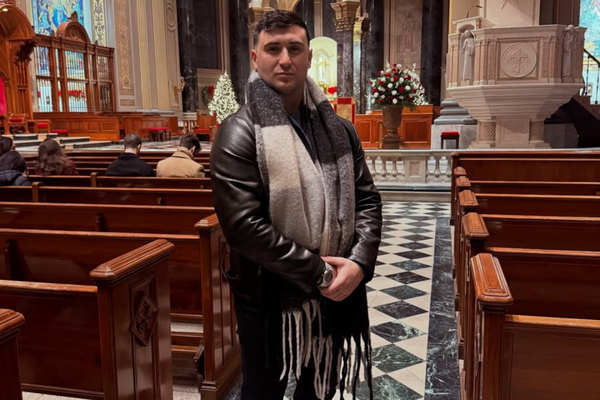
Christmas for Yessica Torres comes together in a single dish — hallacas, the Venezuelan counterpart to tamales, which, between making the dough, cooking the fillings and putting it all together, take hours to make and are prepared alongside family.
“Making hallacas, telling stories, listening to music — that’s Christmas,” said Torres, who learned to make the dish from her father, a restaurant chef back in the South American country.
More than 25,000 migrants have arrived in Chicago in the past year, and many are preparing to celebrate Christmas in their new city for the first time.
It’s an occasion that’s bittersweet — most are thankful to have made it to the United States after fleeing violence, economic free fall and political repression, but, at the holiday, they feel the distance between them and their loved ones more than ever.

Torres, her partner and their kids are planning to celebrate with the other migrants staying at a North Side church that’s been sheltering them through the Faith Community Initiative.
They’ve grown close with the others and will make hallacas together, as well as other staples like pan de jamón — a bread filled with ham, raisins and olives — and ensalada de gallina — a salad made with chicken and potatoes.
But, Torres’ mind will be on her parents, two chefs who fastidiously taught her to make the Christmas staples. They are still in Petare, the infamous slum outside Caracas that’s known as perhaps the single most dangerous place in the entire country.
The final straw before they left for the U.S. was when her son almost got caught in the crossfire of a shootout.
“I never let him out again,” Torres said.

Angolan immigrants wowed by Downtown decorations
The sub-Saharan nation of Angola is separated from Latin America by the Atlantic Ocean, but the reasons Albertina, Miguel and their five children came to Chicago are similar to those given by Venezuelan migrants: violence, hyperinflation and political repression.
For them, Christmas was celebrated with relatives — until recently.
“Before, we were spending Christmas with friends and family, big reunions with food, happiness,” said Miguel, 40. “But in the past few years, everything got too violent.”
The former elementary school teacher — who spoke through an interpreter and asked that his family’s last name not be used — said he’s happy to be in the U.S. where his family is safe.
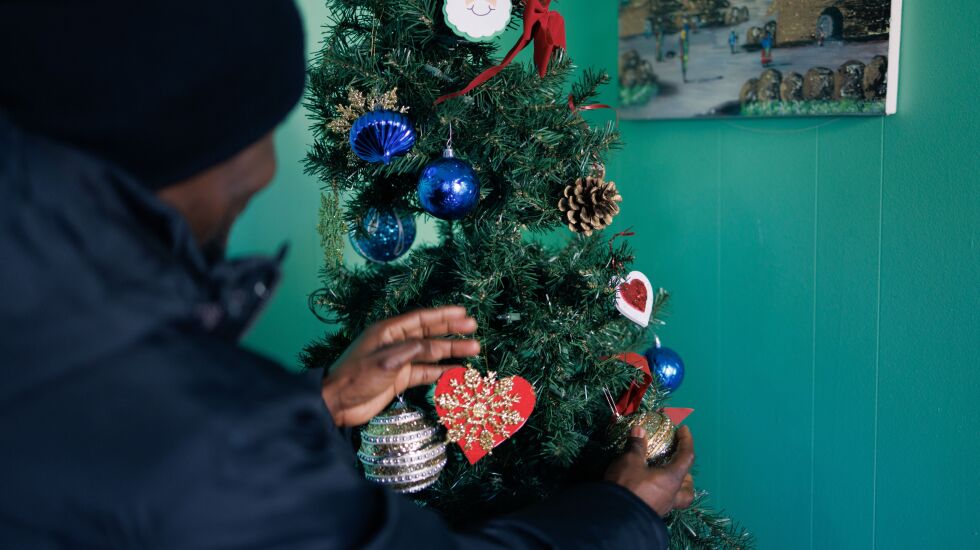
Albertina nods in agreement but tears up thinking about her parents spending Christmas without them.
Still, her mom’s presence will be felt through the dish Albertina plans to make — cachupa, a stew made from sausage and corn. The 32-year-old said it isn’t the most traditional holiday food, but her mom made it for her at Christmas, and now it’s her kids’ favorite.
Unlike when they lived in Angola, they don’t have a Christmas tree inside their South Side apartment, but there’s one in the building and they’re awed by the decorations throughout Chicago.
“They loved it. It’s very different, marvelous,” said Miguel, recalling the impressions of his children after seeing holiday decorations downtown. “Here, you can see the decorations everywhere that — in Angola — only people that have money have the kind of decorations we see here.”
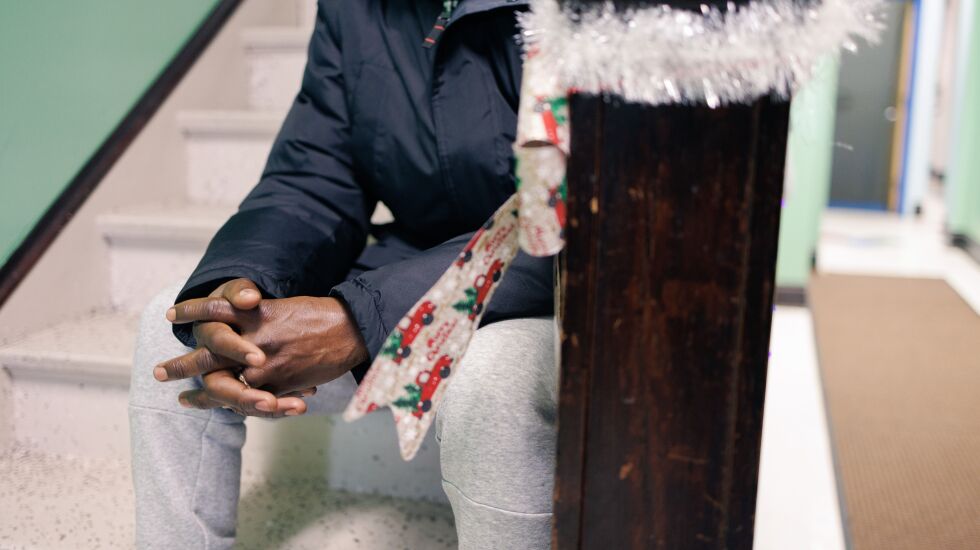
For Haitian couple, it’s hardest missing daughter’s birthday
Kerby, 28, and Mirlande, 29, a couple staying at a North Side shelter, say they left Haiti because of rampant violence in the Caribbean nation.
“There’s no government, just gangs,” said Kerby, who along with his partner spoke through an interpreter and asked to be identified only by their first names. “Gangs that kill everyone. That’s why everyone decided to leave.”
Christmas in Haiti pales in comparison to the jubilee that is New Year’s, Mirlande said, but for her it was always special because her daughter’s birthday falls on Dec. 26.
Mirlande’s daughter Gaele will turn 10 this year, but remains back in Haiti, as does Kerby’s daughter.
“I don’t feel well being away from my daughter and can’t see her,” said Mirlande, 29.
She wishes she had some money to send her daughter so the girl can have a party, but the couple arrived in October and are still getting on their feet as they struggle to learn both English and Spanish.

Venezuelan migrant ‘not going to lose the traditions’ this holiday
Winter Navas wishes he could send something home to his daughters in Venezuela, but he’s struggling to earn much money after being paid less than was promised by employers, he said.
That’s particularly tough for Navas because giving gifts is his favorite part of the holiday
“Seeing the way the kids smile, that’s what it’s about,” said Navas, 42.
That includes his daughters’ reaction when he brought home Azul — their dog — years ago, and his niece smiling in the new sandals he gave her and how his baseball-fanatic nephew loved his new batting gloves so much he wore them to bed.
“It’s hard without my family,” said Navas, holding up a photo of him with his siblings and their mom, a decorated tree in the background.
Still, he plans to try to celebrate much like he did before and will hold a small holiday party with other migrants at his South Side apartment.
They’ll have hallacas, traditional Christmas music and all the same decorations. A turkey is waiting in his freezer already for pavo relleno, or stuffed turkey.
“Even though I’m not with my family, I’m not going to lose the traditions,” he said.
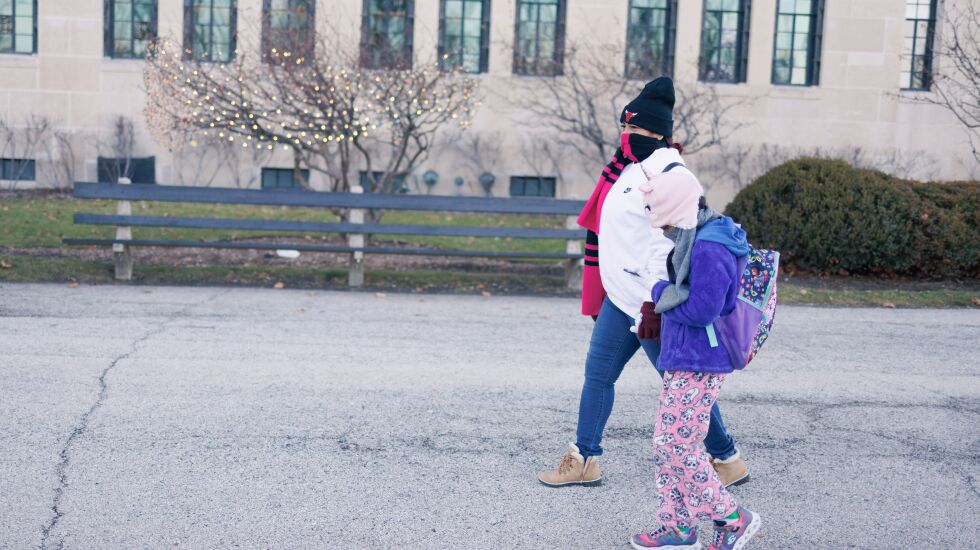
For single mom, necessities have to come before Barbies
Marbelis Valenzuela, a single mother, is with her two children in Chicago but in no position to give any gifts.
They’re among the most recent arrivals and still in need of the most basic necessities.
“Aye, it’s freezing,” said Valenzuela, 37, zipping up her daughter’s coat outside a South Side shelter near the lake. “We need more jackets.”
Her daughter, Emily, however, is excited about the holiday as much as any 8-year-old and began whispering into mother’s ear about it until Valenzuela urged her to share with a reporter.
“I want a dollhouse, Barbies and a bicycle,” she burst out, a grin showing beneath her scarf.

Missing relatives back in South America
Rina Marcano is another migrant staying at the North Side church where Torres is.
She, her daughter and her daughter’s father were among the first arrivals in Chicago in 2022, but they spent their first Chicago Christmas holed up at a state hotel shelter.
Marcano, 25, only moved to the church in the past few weeks after she said her daughter’s father became abusive, and she is looking forward to what will now be a peaceful holiday for her and 5-year-old Isa.
Her mind is also on her parents in Venezuela, who are missing her, as well as their other children.
“This Christmas my dad is going to cry because his kids are gone” said Marcano, her eyes beginning to tear up.
Even if she were home though, she knows that there are others she would be missing.
Millions of Venezuelans have left the country in the past several years and their absence is felt just as much by those who remain, Marcano said.
“Christmas isn’t like it was,” she admitted, “the tables are emptier now and the people are gone.”
Michael Loria is a staff reporter for the Chicago Sun-Times via Report for America, a not-for-profit journalism program that aims to bolster the paper’s coverage of communities on the South Side and West Side.
